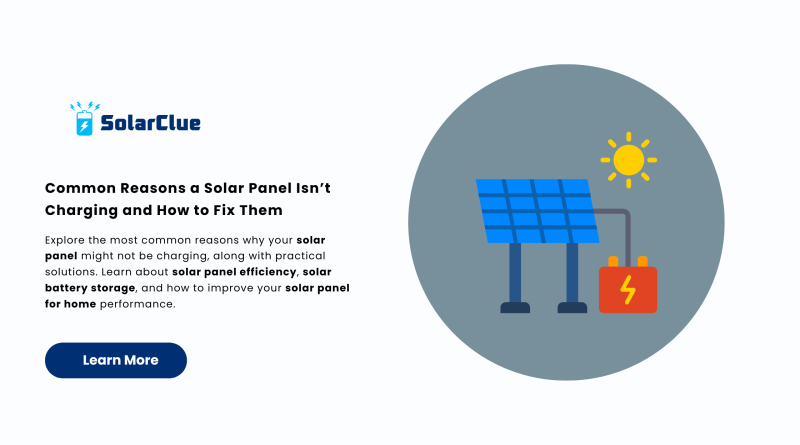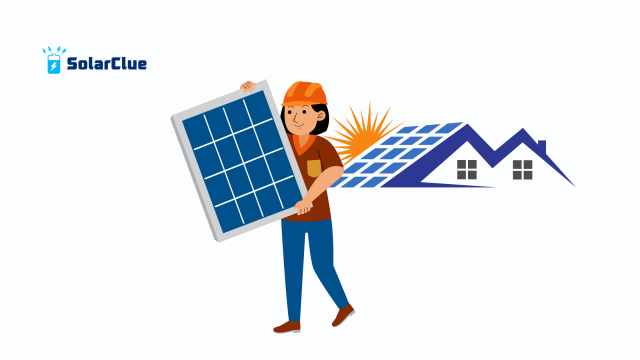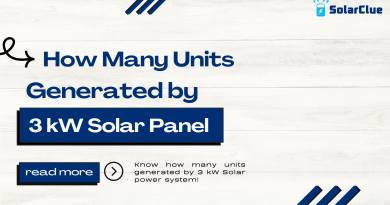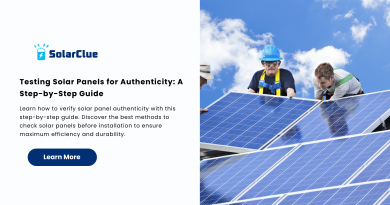Common Reasons a Solar Panel Isn’t Charging and How to Fix Them
Homeowners investing in clean energy often face this frustrating situation—your solar panel system looks perfectly fine, but your battery isn’t charging. If you’re asking, “Why is my solar panel not charging?” you’re not alone. This guide dives deep into the most common causes, long-term fixes, and how to maximize solar panel efficiency while understanding components like solar panel battery and solar battery storage.
Table of Contents
- 1 1. Insufficient Sunlight Exposure
- 2 2. Faulty or Improper Wiring
- 3 3. Inverter Malfunction
- 4
- 5 4. Overloaded System or High Consumption
- 6 5. Faulty Charge Controller
- 7 6. Battery Problems
- 8 7. Poor-Quality or Incompatible Components
- 9 8. System Not Grounded Properly
- 10 9. Aging Panels with Decreased Efficiency
- 11 10. Dirty Panels Affecting Performance
- 12 11. Firmware or Software Issues
- 13 12. Grid-Tied System Limitations
- 14 13. Extreme Weather Conditions
- 15 14. Installation or Design Errors
- 16 15. Lack of Monitoring or Alerts
- 17 Conclusion
- 18 FAQs
1. Insufficient Sunlight Exposure
Sunlight is the primary fuel for your solar panel. If panels are shaded by trees, dust, debris, or even cloudy weather, their performance may drop significantly.
How to Fix:
- Clean your panels regularly to remove dust and bird droppings.
- Trim surrounding trees or move obstructions.
- Adjust panel placement for optimal sun exposure.
2. Faulty or Improper Wiring
A damaged cable, loose connection, or incorrect setup can disrupt the energy flow from your solar panel for home to your solar battery.
How to Fix:
- Hire a certified technician to check for wiring issues.
- Inspect connectors and fuses for signs of corrosion.
3. Inverter Malfunction
The inverter is crucial in converting the DC power from panels into AC power for home use. If it fails, your solar panel battery won’t charge.
How to Fix:
- Look for blinking error codes or red lights on your inverter.
- Contact your manufacturer or solar installer for repairs.
4. Overloaded System or High Consumption
Sometimes, your household uses more energy than your solar panel system produces, especially if your solar battery storage is undersized.
How to Fix:
- Reduce consumption during low-production hours.
- Consider upgrading to a larger solar battery or adding more panels.
5. Faulty Charge Controller
A charge controller regulates voltage from your panels to your solar battery. If it’s broken or incompatible, it may block the charge entirely.
How to Fix:
- Test with a multimeter or seek professional inspection.
- Replace with a compatible and high-quality controller.
6. Battery Problems
Your solar panel battery may be aged, over-discharged, or simply defective. A poor battery affects storage and performance.
How to Fix:
- Check for swelling, corrosion, or low voltage.
- Replace with reliable solar battery options that support high-capacity solar battery storage.
7. Poor-Quality or Incompatible Components
Using mismatched or low-quality components affects the system’s overall health, especially with new installations.
How to Fix:
- Ensure your solar panel, inverter, and battery are compatible.
- Consult with certified installers to verify system compatibility.
8. System Not Grounded Properly
A poorly grounded system can lead to inefficiencies and electrical issues.
How to Fix:
- Ensure your system follows national grounding regulations.
- Have an expert inspect and adjust grounding mechanisms.
9. Aging Panels with Decreased Efficiency
Over time, solar panel efficiency declines due to weather, UV exposure, and general wear and tear.
How to Fix:
- Test the output compared to rated specs.
- Replace panels nearing their end-of-life or consider a solar panel price comparison for a newer model.
10. Dirty Panels Affecting Performance
Dust, pollen, and dirt reduce sunlight absorption and overall solar panel efficiency.
How to Fix:
- Clean panels every few months with water and a soft cloth.
- Schedule routine professional maintenance.
11. Firmware or Software Issues
Some advanced systems with smart monitoring tools might stop charging due to software bugs.
How to Fix:
- Reboot the system or update the firmware.
- Contact support from your solar equipment provider.
12. Grid-Tied System Limitations
In grid-tied setups, excess energy is fed to the grid. If your utility company restricts reverse flow or limits battery charging, this may cause issues.
How to Fix:
- Consult with your utility provider.
- Install smart meters or hybrid inverters.
13. Extreme Weather Conditions
Excessive heat, snow, or hail can damage or reduce the performance of your solar panel for home.
How to Fix:
- Install protective coverings or opt for weather-resistant panels.
- Monitor performance during seasonal changes.
14. Installation or Design Errors
Incorrect panel tilt, placement, or system sizing can result in underperformance.
How to Fix:
- Get a second opinion from certified experts.
- Reconfigure the setup if necessary.
15. Lack of Monitoring or Alerts
Many homeowners don’t realize their solar battery isn’t charging until it’s too late.
How to Fix:
- Use mobile monitoring apps or solar system dashboards.
- Set up alerts for unusual drops in power generation.
Conclusion
A non-charging solar panel system can be traced back to various causes—some minor and easy to fix, others more complex. Regular maintenance, system monitoring, and using high-quality, compatible components can prevent many issues before they arise. Investing in efficient solar battery storage and reliable solar panel for home systems ensures optimal performance and peace of mind. For those considering an upgrade or installation, you can compare solar panel price options and expert recommendations by visiting solarclue.com or checking helpful insights on blog.solarclue.com. Keep your system sunny-side up!
FAQs
1. How do I know if my solar panel is charging or not?
Check your solar system’s monitoring app or look at the inverter display. If there’s no power flow, blinking error lights, or an empty battery icon, your system may not be charging.
2. Can a faulty inverter stop my solar battery from charging?
Yes. A malfunctioning inverter can disrupt the power conversion process, preventing your solar battery from charging properly.
3. How often should I clean my solar panels?
At least twice a year. However, more frequent cleaning is advisable if you live in a dusty area or near heavy tree cover.
4. Does the type of solar battery affect charging?
Absolutely. Not all solar battery types have the same compatibility or efficiency. Choosing the right solar battery storage system is essential for performance.
5. What should I do if my solar panel is under warranty but not working?
Contact your installer or the manufacturer. Most warranties cover component failures within a specific period.
Let your solar journey be stress-free and powerful—explore solutions and expert help at solarclue.com or get the latest updates from blog.solarclue.com!





